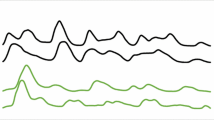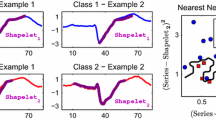Abstract
Relatively little work in the field of time series classification focuses on learning effectively from very large quantities of data. Large datasets present significant practical challenges in terms of computational cost and memory complexity. We present strategies for extending two recent state-of-the-art methods for time series classification—namely, Hydra and Quant—to very large datasets. This allows for training these methods on large quantities of data with a fixed memory cost, while making effective use of appropriate computational resources. For Hydra, we fit a ridge regression classifier iteratively, using a single pass through the data, integrating the Hydra transform with the process of fitting the ridge regression model, allowing for a fixed memory cost, and allowing almost all computation to be performed on GPU. For Quant, we ‘spread’ subsets of extremely randomised trees over a given dataset such that each tree is trained using as much data as possible for a given amount of memory while minimising reads from the data, allowing for a simple tradeoff between error and computational cost. This allows for the straightforward application of both methods to very large quantities of data. We demonstrate these approaches with results (including learning curves) on a selection of large datasets with between approximately 85, 000 and 47 million training examples.
Access this chapter
Tax calculation will be finalised at checkout
Purchases are for personal use only
Similar content being viewed by others
References
Bagnall, A., et al.: The UEA multivariate time series classification archive. arXiv:1811.00075 (2018)
Bagnall, A., Lines, J., Bostrom, A., Large, J., Keogh, E.: The great time series classification bake off: a review and experimental evaluation of recent algorithmic advances. Data Min. Knowl. Disc. 31(3), 606–660 (2017)
Brain, D., Webb, G.I.: The need for low bias algorithms in classification learning from large data sets. In: Elomaa, T., Mannila, H., Toivonen, H. (eds.) Principles of Data Mining and Knowledge Discovery, pp. 62–73. Springer, Berlin (2002)
Breiman, L.: Pasting small votes for classification in large databases and on-line. Mach. Learn. 36(1), 85–103 (1999)
Cabello, N., Naghizade, E., Qi, J., Kulik, L.: Fast, accurate and explainable time series classification through randomization. Data Min. Knowl. Discov. (2023)
City of Melbourne: Pedestrian counting system (2022). https://data.melbourne.vic.gov.au/explore/dataset/pedestrian-counting-system-monthly-counts-per-hour/information/. CC BY 4.0
Dau, H.A., et al.: The UCR time series archive. IEEE/CAA J. Autom. Sinica 6(6), 1293–1305 (2019)
Dempster, A., Petitjean, F., Webb, G.I.: ROCKET: exceptionally fast and accurate time series classification using random convolutional kernels. Data Min. Knowl. Disc. 34(5), 1454–1495 (2020)
Dempster, A., Schmidt, D.F., Webb, G.I.: MiniRocket: a very fast (almost) deterministic transform for time series classification. In: Proceedings of the 27th ACM SIGKDD Conference on Knowledge Discovery and Data Mining, pp. 248–257. ACM, New York (2021)
Dempster, A., Schmidt, D.F., Webb, G.I.: Hydra: competing convolutional kernels for fast and accurate time series classification. Data Min. Knowl. Discov. (2023)
Dempster, A., Schmidt, D.F., Webb, G.I.: Quant: a minimalist interval method for time series classification. Data Min. Knowl. Discov. (2024)
Fanioudakis, E., Geismar, M., Potamitis, I.: Mosquito wingbeat analysis and classification using deep learning. In: 26th European Signal Processing Conference, pp. 2410–2414 (2018)
Garnot, V.S.F., Landrieu, L., Giordano, S., Chehata, N.: Satellite image time series classification with pixel-set encoders and temporal self-attention (2020)
Hastie, T., Tibshirani, R., Friedman, J.: The Elements of Statistical Learning: Data Mining, Inference, and Prediction. Springer, New York (2009)
Hooker, S.: The hardware lottery. Commun. ACM 64(12), 58–65 (2021)
Ioffe, S., Szegedy, C.: Batch normalization: accelerating deep network training by reducing internal covariate shift. In: Proceedings of Machine Learning Research, pp. 448–456 (2015)
Ismail-Fawaz, A., Devanne, M., Weber, J., Forestier, G.: Deep learning for time series classification using new hand-crafted convolution filters. In: IEEE International Conference on Big Data, pp. 972–981 (2022)
Ismail Fawaz, H., et al.: InceptionTime: finding AlexNet for time series classification. Data Min. Knowl. Disc. 34(6), 1936–1962 (2020). https://doi.org/10.1007/s10618-020-00710-y
Louppe, G.: Understanding random forests: from theory to practice. Ph.D. thesis, University of Liège (2014). arXiv:2305.11921
Louppe, G., Geurts, P.: Ensembles on random patches. In: Flach, P.A., De Bie, T., Cristianini, N. (eds.) Machine Learning and Knowledge Discovery in Databases, pp. 346–361. Springer, Berlin (2012)
Middlehurst, M., Large, J., Bagnall, A.: The canonical interval forest (CIF) classifier for time series classification. In: IEEE International Conference on Big Data, pp. 188–195 (2020)
Middlehurst, M., Large, J., Flynn, M., Lines, J., Bostrom, A., Bagnall, A.: HIVE-COTE 2.0: a new meta ensemble for time series classification. Mach. Learn. 110, 3211–3243 (2021)
Middlehurst, M., Schäfer, P., Bagnall, A.: Bake off redux: a review and experimental evaluation of recent time series classification algorithms. Data Min. Knowl. Discov. (2024)
Miller, B.S., et al.: An open access dataset for developing automated detectors of Antarctic baleen whale sounds and performance evaluation of two commonly used detectors. Sci. Rep. 11 (2021)
Miller, B.S., Stafford, K.M., Van Opzeeland, I., et al.: Whale sounds (2020). https://data.aad.gov.au/metadata/AcousticTrends_BlueFinLibrary. CC BY 4.0
Sainte Fare Garnot, V., Landrieu, L.: S2Agri pixel set (2022). https://zenodo.org/records/5815488. CC BY 4.0
Schäfer, P., Leser, U.: WEASEL 2.0: a random dilated dictionary transform for fast, accurate and memory constrained time series classification. Mach. Learn. 112(12), 4763–4788 (2023)
Sutton, R.: The bitter lesson (2019). http://www.incompleteideas.net/IncIdeas/BitterLesson.html
Tan, C.W., Dempster, A., Bergmeir, C., Webb, G.I.: MultiRocket: multiple pooling operators and transformations for fast and effective time series classification. Data Min. Knowl. Disc. 36(5), 1623–1646 (2022)
Tew, S., Boley, M., Schmidt, D.F.: Bayes beats cross validation: efficient and accurate ridge regression via expectation maximization. In: 37th Conference on Neural Information Processing Systems (2023)
The aeon Developers: aeon (2024). https://github.com/aeon-toolkit/aeon
Transport for NSW: NSW road traffic volume counts hourly (2023). https://opendata.dev.transport.nsw.gov.au/dataset/nsw-roads-traffic-volume-counts-api/resource/bca06c7e-30be-4a90-bc8b-c67428c0823a. CC BY 4.0
This work was supported by the Australian Research Council under award DP240100048.
Author information
Authors and Affiliations
Corresponding author
Editor information
Editors and Affiliations
Rights and permissions
Copyright information
© 2025 The Author(s), under exclusive license to Springer Nature Switzerland AG
About this paper
Cite this paper
Dempster, A., Tan, C.W., Miller, L., Foumani, N.M., Schmidt, D.F., Webb, G.I. (2025). Highly Scalable Time Series Classification for Very Large Datasets. In: Lemaire, V., et al. Advanced Analytics and Learning on Temporal Data. AALTD 2024. Lecture Notes in Computer Science(), vol 15433. Springer, Cham. https://doi.org/10.1007/978-3-031-77066-1_5
Download citation
DOI: https://doi.org/10.1007/978-3-031-77066-1_5
Published:
Publisher Name: Springer, Cham
Print ISBN: 978-3-031-77065-4
Online ISBN: 978-3-031-77066-1
eBook Packages: Computer ScienceComputer Science (R0)





